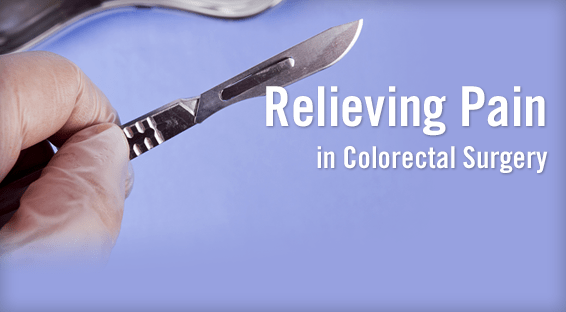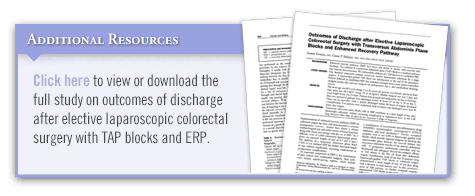Researchers have developed enhanced recovery pathways (ERP) to improve outcomes and reduce readmissions in colorectal surgery patients. “ERP protocols use a set of standardized pre- and postoperative orders,” explains Conor P. Delaney, MD, PhD, FACS, FASCRS. “Research clearly shows that these protocols can help speed recovery and improve outcomes.” ERP protocols emphasize early mobilization after surgery, optimal analgesia, and control of intravenous fluid volumes. Patients are also encouraged to eat the day after their procedure rather than wait several days.
To further improve outcomes, it has been hypothesized that adding a transversus abdominis plane (TAP) block to ERP protocols may allow patients to bypass or reduce narcotics use after surgery. TAP blocks are usually administered with ultrasound guidance, but a laparoscopic technique has been developed in which regional analgesia is injected into the abdominal wall between the oblique muscles and the transversus abdominis. “The TAP block can be given after surgery to reduce pain in the operative area,” says Dr. Delaney. “While narcotics help alleviate pain, they can slow recovery. The TAP block is different in that it wears off in time for patients to avoid the worst pain that typically occurs immediately after surgery.”
Encouraging Data
In a study of 100 patients published in the Journal of the American College of Surgeons, Dr. Delaney and colleagues tested the use of a laparoscopically administered TAP block as part of ERP protocols. After the block, patients were also given intravenous painkillers. According to findings, the average hospital stay after surgery dropped to less than 2.5 days for those receiving the TAP block. This was significantly lower than what has been observed in previous analyses that did not use a laparoscopic TAP block.
“About two-thirds of patients were discharged within 48 hours of their operations, and many were discharged within 24 hours,” says Dr. Delaney. “This is a large improvement on the amount of time usually spent in the hospital after laparoscopic and open colorectal procedures.” He adds that the TAP block does not appear to pose any significant risks to patients, noting that there were no mortalities in the study. Patients who had complications or required longer hospitalizations were considered higher risk because of advanced age or additional health conditions.
Significant Implications
Dr. Delaney says that using a laparoscopic TAP block to reduce hospital stay and narcotics use has implications for decreasing healthcare costs. “The TAP block is relatively inexpensive when used selectively,” he says. “It’s possible that ERP protocols will soon become standard practice for colorectal surgery, but more evidence is needed. If our findings are further validated, we may be able to safely discharge patients more quickly after surgery while also enhancing outcomes.”




 TimH
TimH